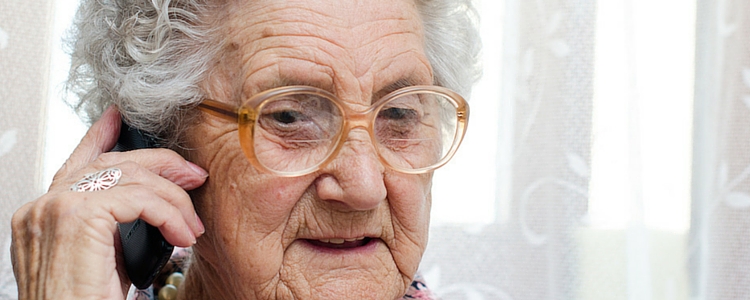Senior Help Line, combating loneliness one call at a time
Posted on 9th March 2016

When we look back over calls to Senior Help Line for a typical week or a month, we are struck all over again at the stark conditions in which some older people live.
‘My husband is very abusive, I have coped with this all my life, the children are gone now and I feel very alone’.
‘My boiler is broken, I don’t have the money to fix it, and I’m very cold’.
‘I had a row with my son, now I don’t see the grandchildren. I am heart broken’.
The above is just a random sample of the 1200 calls we receive on average every month.
Does it make any difference that we are there? We are only a telephone listening service after all. We can’t help practically. We don’t visit people, we don’t do their shopping for them, we don’t bring them to the doctor, we don’t help financially. We never even meet them. Most of all, we don’t go out and challenge abusive husbands or mend broken boilers or act as mediators between lonely mothers and possibly angry sons.
So what do we do? We listen in a very particular way. Our volunteers are trained to listen intently and carefully to what our callers say. Often we have to listen to the spaces in the conversation, to what is not said, what may be hinted at, suggested. We learn to listen to the feelings behind the words, the sadness often masking anger, the fear that may be concealed in the recitation of facts.
But what’s the point of listening, say the devil’s advocates. Listening doesn’t do anything. Listening is passive. We can all listen – what difference does it make?
First of all, maybe all of us can listen, but most of us don’t. Take this test yourself next time you are in company. Begin to tell a story, begin to respond to someone who asks ‘how are you?’. Begin to tell them how you are, or to talk about something on your mind. See how far you can go without being interrupted. Count the minutes. Count the seconds. Wait for the typical responses.
Depending on what you are saying, these might be:
- ‘that’s ridiculous, I wouldn’t stand for that’
- ‘You need to.....’
- ‘That happened to my neighbour, she got in touch with....’
Or many other variations on this theme.
The fact is that many people find it very difficult to listen, to give attention without interrupting and without offering their solutions. When you meet someone who really listens to you, you feel the better for it. You feel heard, you might feel your heart is lighter, you may have been able to share a burden. You could feel valued. In telling the story, you may often feel clearer towards a resolution.
Because that’s the point about real empathic listening. It’s not passive. It can be active. Dynamic. Life giving. Add to this the situation of many Senior Help Line callers who live alone. When you are on your own, when you may be old and frail, when you have nobody to share your worries with, anxieties may magnify.
So when callers phone Senior Help Line they are often caught up in worry or fear. Very many are lonely, they may feel alone. Think of the relief of telling someone, pouring it all out and knowing that someone is listening. Go further and think of the support that you may experience when you are invited to say more, to explain as fully as you wish.
What happens next? Are we just a listening post? No, while listening is a big part of the picture, it is now always the whole part. Often, when a caller has explained what is going on in their lives, they feel better just for the telling. They don’t feel so alone with the weight of sorrow or worry. And sometimes in the telling lies the resolution. Telling the story has helped with clarity, and may have helped them to see a way forward. This new direction can also be explored in the conversation. Often callers are helped to discuss what would happen if, for example, they sought help in an abusive marriage, or made that phone call to an estranged son. Our volunteers can also signpost callers to practical services who just may be able to help with that broken boiler.
Three out of four Senior Help Line callers tell us they feel better for the call. Some people phone constantly or daily for company and contact. Newer callers may phone over a period of crisis. Others phone regularly/occasionally, contacting when they feel low or when new needs emerge.
Senior Help Line is open every day of the year from 10am til 10pm. Our LoCall number is 1850 440 444 and no landline calls costs more than 30 cent irrespective of length. We are just a telephone line. But we seem to make a difference.


